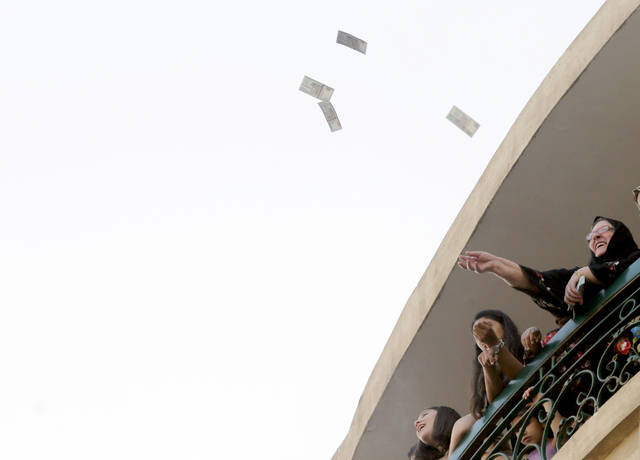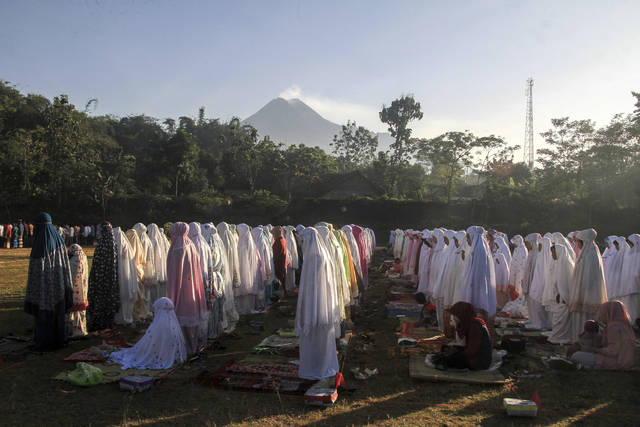GAZA CITY, Gaza Strip — Several thousand Gaza worshippers knelt on prayer rugs spread on sandy soil, near the perimeter fence with Israel, joining hundreds of millions of Muslims around the world Friday in marking the holiday that caps the fasting month of Ramadan.
The three-day Eid al-Fitr holiday is traditionally a time of family visits and festive meals, with children getting new clothes, haircuts and gifts. In the Middle East, celebrations were once again marred by prolonged conflict in hot spots such as Syria, Afghanistan, Yemen and the Gaza Strip.
In Syria, two people visiting graves of relatives during the holiday were killed in government shelling of a cemetery, activists said. In Yemen, officials said dozens of fighters from a Saudi-led coalition backing an exiled government were killed in fighting over the rebel-held port of Hodeida, the main entry point for food into a country already on the brink of famine.
In Gaza, an Israeli drone attacked a tent used to prepare kites and balloons rigged with incendiary devices for launch into Israel, a witness said. The balloons and kites are the latest tactic in weeks-long protests against a blockade of Gaza, imposed by Israel and Egypt after the 2007 takeover of the territory by the Islamic militant group Hamas. Since late March, more than 120 protesters have been killed and more than 3,800 wounded by Israeli army fire in the area of the fence.
Earlier Friday, several thousand Gaza worshippers performed the traditional morning prayers of the holiday in areas several hundred meters (yards) away from the fence.
Ismail Haniyeh, the top Hamas leader, joined worshippers in an area east of Gaza City. At one point, as the faithful bowed their heads on their prayer mats in unison, a young man on crutches — presumably injured in previous protests — followed the ritual while he remained standing. Some activists later approached the fence, burning tires.
The protests have been organized by Hamas, but turnout has been driven by growing despair in Gaza about blockade-linked hardships; unemployment now approaches 50 percent and electricity is on for just a few hours every day.
Hamas has also billed the protests as the “Great March of Return,” suggesting they would somehow pave the way for a return of Palestinian refugees and their descendants — about two-thirds of Gaza’s residents — to return to ancestral homes in what is now Israel.
Hundreds of thousands of Palestinians were expelled or fled in the Mideast war over Israel’s 1948 creation.
Haniyeh told reporters after Friday’s prayers, which were also being held outdoors in another location east of the town of Khan Younis, that protests would continue.
He said a recent U.N. General Assembly resolution blaming Israel for the Gaza violence “shows that the marches of return and breaking the siege revived the Palestinian issue and imposed the issue on the international agenda.” The resolution also said Israel had used excessive force against Palestinian protesters.
Israel says it is defending its territory and civilians living near Gaza. It has accused Hamas of using the protests as cover for damaging the fence and trying to carry out cross-border attacks. Israel and Egypt argue that the blockade is needed to contain Hamas which has a history of violence and refuses to disarm.
Later Friday, the Israeli military said an aircraft fired warning shots at Palestinians preparing balloon bombs, and at a nearby vehicle. It said it views the devices with “great severity” and will act against them. Such a device landed in Israel earlier Friday and was detonated by police.
Israel has been battling large fires caused by kites and balloons rigged with incendiary devices or burning rags. The fires have reportedly destroyed hundreds of acres of crops and forest.
Mohammed al-Tayyar, a member of a Gaza group that calls itself the “burning kites unit,” said Friday large numbers of kites and balloons would be sent in the coming days.
In Jerusalem, senior Muslim cleric Muhammad Hussein told tens of thousands of worshippers that a plan for an Israeli-Palestinian peace deal, expected to be unveiled by the Trump administration, is unfair and “aims at the liquidation of the Palestinian cause.”
President Donald Trump has promised to negotiate the “ultimate deal” but the plan’s reported — though unconfirmed — parameters have been dismissed by the Palestinians as favoring Israel.
The Palestinian issue also loomed large in Iran. President Hassan Rouhani said in a holiday message that he believes the “land of Palestine will be returned to owners of the land with the help if God.” Iran and Israel are bitter foes.
In Afghanistan, a U.S. drone strike killed Pakistan Taliban chief Mullah Fazlullah, the insurgent leader who ordered the assassination of Nobel Peace Prize winner Malala Yousafzai. A Defense Ministry spokesman said Friday that Fazlullah and two other insurgents were killed early Thursday morning, just hours before Afghanistan’s Taliban began a three-day cease-fire to mark Eid al-Fitr.
———
Associated Press writers Ian Deitch in Jerusalem and Karin Laub in Jericho, West Bank, contributed.




